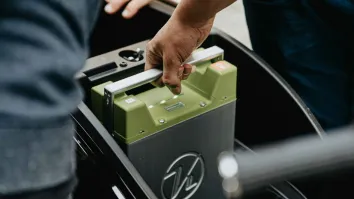
What Makes BNI's API Service Stand Out in the Open Banking Era?
Until December 2023, the bank's application programming interface attracted 4,000 customers and generated transactions worth IDR 828 trillion in the past year.
In the fast-paced world of finance, application programming interfaces (APIs) have emerged as a game-changer, and it could be easily said that Bank Negara Indonesia (BNI) is leading the charge in Indonesia’s financial landscape.
What exactly is worth raving about with BNI’s API service in this era of an open banking system?
Interviewed by Asian Banking and Finance, BNI Senior Executive Vice President for Retail Digital Solutions Rian Eriana Kaslan cited how their SNAP API service stands out for efficiency and reliability, offering a comprehensive suite of digital services.
“Currently, we have implemented the standardised SNAP API service,” said Kaslan. “This initiative is expected to simplify and expedite customer transactions.”
In line with the goals outlined in BI's Blueprint 2025, BI promotes Open Banking for Indonesia's payment system by standardizing open APIs called Standar Nasional Open API Pembayaran (SNAP). BNI was a pioneer among other bank in developing the SNAP standard and is known as the "first mover".
Since APIs serve as digital bridges, BNI has committed to make its API Portal serve as a gateway that enables seamless communication and interaction between different software applications to unlock a myriad of digital banking functionalities and cater to diverse customer needs.
Playing its role
In terms of being a driving force for economic growth, BNI’s API services play a significant role in shaping the country’s financial sector.
This, of course, is in the context of Indonesia’s digital financial landscape leading towards an open banking ecosystem that tends to more effective data management, operational efficiency, integrated services, and safer technological infrastructure.
Kaslan stressed that BNI is actively driving the open banking system in line with Bank Indonesia's 2025 Payment System Blueprint through its implementation of key API services. Until December 2023, BNI API has successfully attracted 4,000 customers, generating a total of 389 million API hits with 154 million transaction items. The total value of transactions reached IDR 828 trillion.
She emphasised that BNI API has significantly contributed to changing the financial sector landscape in Indonesia, providing easier and more efficient access to banking services for customers.
“Moreover, BNI API also plays a crucial role in accelerating digital transformation in the financial and banking sector in Indonesia by facilitating collaboration between banks and financial technology (FinTech) companies as well as institutions, creating a conducive environment for the growth and development of the digital financial industry,” she said.
BNI itself has a strategy in accelerating digital transformation based on three pillars, namely on the business, process, and people sides. “For the business side, BNI will focus on quality pipeline acquisitions, top-tier customer focus to increase market share through total digital solutions & transaction banking, deepening business ecosystem penetration, and synergy with subsidiary companies,” the bank executive explained.
In the context of processes, several digital innovation initiatives focus on the customer journey from onboarding, usage, to after-sales services in the market. “Additionally, exploration of technology trends that can provide positive impacts, especially for customer convenience, is also being pursued,” she said.
Leveraging latest technology
BNI API utilises the latest security technology, including data encryption, two-factor authentication, and face recognition, to protect customer financial information and data from cyberattacks and data leaks. Additionally, customers can access the BNI API digital services portal containing sandboxes, postman collections, and technical documentation to facilitate testing applications created using the BNI API.
“Customer data security and privacy are our top priorities at BNI API. We ensure that all transactions processed through our system are safe and protected,” said Kaslan. “We also have high-security standards and proven systems for customer fund and information security,” she added.
She also emphasised that they ensure security in the use of APIs, both from the credentials given to the user and the secret keys that must be kept by the customer. BNI has also implemented the National Payment API Standard initiated by the regulator, Bank Indonesia, to standardise API service security.
Developing new features
BNI first implemented APIs in 2017, starting with the virtual account service. Then in 2019, they launched the BNI API digital services portal to facilitate potential user customers, explore API services, and facilitate integration.
“We have also developed new features such as a more complete sandbox, Software Development Kit (SDK) to facilitate customers in designing applications, and an 'auto-populate' feature that allows customers to automatically fill in sample data,” said Kaslan.
She added that BNI always encourages increased digital transactions driven by several outstanding features of the BNI API, including disbursement, payment, collection, supply chain management, digital account opening, and account information.
For example, through BNI API One Gate Payment, customers can access banking services such as balance information, account information, transfers to other BNI accounts or to other banks, and transaction status information.
In addition, BNI API supports fintech and eCommerce with solutions for digital consumer payment receipts through Virtual Account solutions.
“Furthermore, BNI continues to innovate and develop new API features to serve transactions such as supply chain financing, remittance, and more,” she told Asian Banking and Finance, adding that BNI API has officially licensed a total of 280 Service APIs to date.
Responding to trends
BNI API also responds to changes in consumer behaviour through the BNI API Digital Services portal, they empower potential user customers. The portal makes it easy to explore BNI's API services and facilitates a smooth integration process, saving a valuable time and resources.
“We view changes in consumer behaviour not only as challenges but also as opportunities for the banking industry,” said Kaslan. “By providing access to various banking services through APIs, we have actively helped provide solutions for customers to create innovative and responsive applications to meet customer needs,” she added.
BNI API designs strategies to remain relevant and innovative amidst increasingly fierce competition in the Indonesian financial sector by focusing on a deep understanding of customer needs and market trends.
“By doing so, we can continue to provide superior services amidst increasingly fierce competition,” she said.

















 Advertise
Advertise









